Stroke
1. Accurate diagnosis is the key to successful treatment.
Why is it important to accurately diagnose a stroke? The nature of stroke - hemorrhage or infarction of the brain to use the eye hard every p'fifth clinical diagnosis by an experienced physician, is erroneous. For example, the doctor takes a brain hemorrhage cerebral infarction and assigns the patient blood thinners. The result is the patient dies only because he was treated improperly.
the Precise diagnosis can only be made during the examination using the computer'computer tomography or MRI. Timely diagnosis is extremely important because emergency measures can significantly reduce the effects of shock.
the Stroke center of the Universal clinic “safeguarding” provides the ability to pass a full diagnostic to exclude or confirm the diagnosis of stroke, and to determine its type (ischemic or hemorrhagic). Diagnosis lasts about 4 hours, and include: mandatory'askofu MRI or MSCT diagnosis of brain, to determine the type of stroke, as well as the localization, a complete set of laboratory tests, ECG and consultation with a neurologist, which is, after all diagnostic procedures gives its opinion and recommendations on how to treat a stroke.
2. Intensive therapy in the acute period.
Acute stroke refers to the urgent conditions and what will be the actions in the first hours and days of “vascular catastrophes” on the fate of the patient, and often his life. Treatment of cerebral stroke in a specialized unit of our clinic provides constant monitoring of vital body functions - breathing, heart activity, kidney, etc. a Stroke is always a powerful stress to the body, aggravates all chronic diseases. For example, if a person had diabetes in a mild form when you can simply take a tablet medication, then after a stroke the patient has to move to insulin. Affects all organs and systems and the need to support their work and to deal with such terrible complications of a stroke as swallowing disorders, leading to severe pneumonia with thrombosis due to immobility of the patient. All this is possible in our center, equipped with modern breathing apparatus, monitors, monitor heart, blood oxygen saturation, blood parameters, etc. in addition, full access to modern diagnostic facilities (CT, MRI, ultrasound of heart, blood vessels, EEG, clinical and biochemical laboratory) allow time to correct the violations and to timely recognize life-threatening complications.
Stroke center of the Universal clinic “charm”, introducing the experience of the best stroke centers in the world, the principle of early mobilization of the patient. This, in turn, means that as soon as all the vital indicators of the patient stabilized, it is possible to raise from his hospital bed and begin early rehabilitation aimed at restoration of disturbed functions and neutralize the effects of stroke. It gives the most positive forecast of recovery of the patient.
How to prevent repeat strokes and further progression of the primary processes (atherosclerosis, hypertension, diabetes, thrombosis, etc.)? The mainstay of medical therapy after a stroke is secondary prevention. First drug therapy after ischemic stroke aims to reduce the coagulation activity of the blood and prevent blood clots, therefore, all patients with ischemic stroke or transient ischemic attack (TIA) should be conducted antiplatelet and / or anticoagulant therapy. In case of detection of hypertension (high blood pressure) in a patient who suffered a stroke in the secondary prevention algorithm adds antihypertensive drugs. Lipid disorders (cholesterol and fractions) are added to the algorithm is the need to use drugs that normalize lipid metabolism of statins. Thus, at least a triad of drugs (antiplatelet agents / anticoagulants, antihypertensives, and statins) constitute the drug treatments after stroke. More patients adhere to doctor's recommendations on taking medication for secondary prevention, the more effective the prevention of recurrent strokes. That is, secondary prevention of stroke and is synonymous with post-stroke medication. All other medications that are assigned to this period do not affect the prognosis of the disease and often even harmful to the patient.
3. Rehabilitation after a stroke.
After a severe stroke people are different. The majority of patients suffer from severe depression. This is especially difficult for those who are accustomed to an active lifestyle. They are incredibly difficult to adapt to the new conditions under the name “life after stroke". Some become aggressive, irritable, and unfair to families. Stroke, like any serious illness, experiences of human strength and no one has the right to judge those who can not withstand this test.
a recovery after a stroke Stroke center clinics “safeguarding” and the whole developed world, involves a multidisciplinary range of physical, mental and social rehabilitation, which starts as early as possible (often in the first days after stroke), proceeds continuously and with high intensity for a long time to achieve the maximum possible result. Rehabilitation in a Stroke center clinic on the stationary phase carries a multidisciplinary team of specialists (kinezioterapevt, the occupational therapists, speech therapists, neuropsychologists, physiotherapists, etc.), with the participation of the relatives of the patient, taking into account its needs for a specially designed individual program of rehabilitation. The basis of the program is active in everything from early verticalization of the patient to intensive lessons in the recovery of motor functions and speech, skills for care and self-monitoring and correction of psycho-emotional functions in stroke patients. All activities are aimed at increasing self-esteem and quality of life of the patient and others.
With the patients of the Stroke unit operates up to 5 different specialists, both doctors and rehabilitators. Every day the patient spends 3 to 5 hours, being engaged in various rehabilitation practices is the only way to achieve the desired outcome and maximum recovery.
a Stroke — not a death sentence! Proven Stroke center clinics “safeguarding”! If You or Your loved one suffered a stroke, pam'remember the fastest possible hospitalization in a specialized Stroke center significantly increases the chances of surviving a serious disease! Do not hesitate, call the contact center of the Universal clinic “safeguarding” by phone:
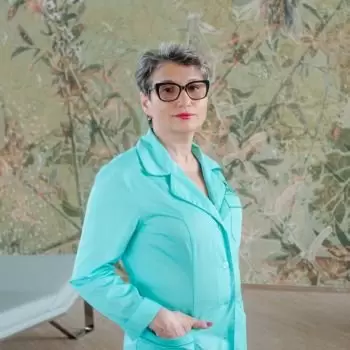 Huliaeva Maryna
Huliaeva Maryna
- Head of the scientific and organizational department of the Stroke Center
- Head of Scientific Department of the Stroke Center
- 40 years of medical experience
- Honored Doctor of Ukraine
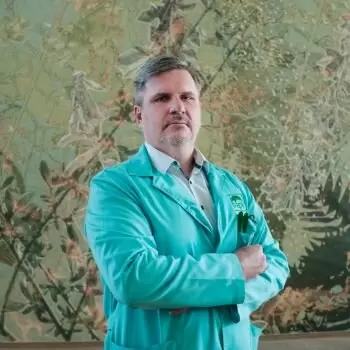 Flomin Yuriy
Flomin Yuriy
- Neurologist of the Stroke Center
- Head of the Stroke Center
- PhD in Medical Sciences
- Honored Doctor of Ukraine
- 31 years of medical experience
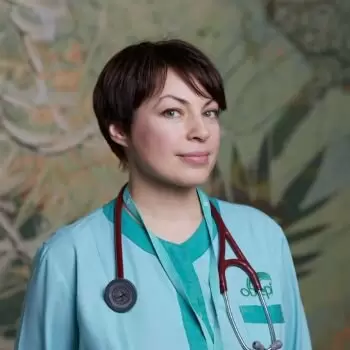 Havryliv Iryna
Havryliv Iryna
- Neurologist of the Stroke Center
- 25 years of medical experience
- PhD in Medical Sciences
Stroke Center of the Universal Clinic "Oberig" - it is a medical unit that has all the necessary medical-diagnostic and professional resources to help a patient with a stroke at any stage - whether diagnosis of stroke , intensive care of stroke in the acute period or rehabilitation after stroke .
26.12.2025
Все сподобалось. Чудова лікарка - компетентна і уважна! Рекомендую!
30.05.2025
Від щирого серця дякую лікарям! Хочу висловити свою щиру подяку лікарям та всьому медичному персоналу за високий професіоналізм, чуйність, турботу та підтримку протягом усього л...
15.01.2025
З 26.11.2024 р. до 12.01.2025 р. мій чоловік проходив лікування в інсультному центрі клініки "Оберіг". 20 днів лікарі, медсестри, санітари боролися за його життя, бо привезли його ...
29.05.2025
Хочу висловити щиру вдячність клініці "Оберіг" і особливо лікарю Фломіну Юрію за порятунок нашої бабусі. Після інсульту вона перебувала в державній лікарні у вкрай тяжкому стані — ...
07.06.2025
Я попала в клініку у квітні 2019 року. Пробула там 6 тижнів. У мене були 2 ішемічних інсультів. Дякую лікарям дуже за те, що вони поставили мене на ноги в прямому і переносному сен...
10.06.2025
Рекомендуємо цю клініку, а саме інсультний центр. В батька стався інсульт - до такого ні коли не можна бути готовим. У інсультному відділені зробили якісну роботу - зробили батька ...
12.06.2025
Хочу висловити щиру подяку що до реабілітація важкого чоловіка!З лютого місяця по травень знаходився у клініці та отримав гарний результат реабілітації,приїхавши на візочку вийшов ...
31.05.2025
Коли трапляється інсульт в рідної/близької людини чи коханого(Ї) половинки - це завжди неочікувано, непередбачувано, несправедливо, тяжко/важко і дуже страшно. В перший самий важли...
03.02.2026
Хочу щиро подякувати клініці «Оберіг» за високий рівень професіоналізму, турботу та людяний підхід. З перших хвилин перебування відчувається увага до пацієнта, злагоджена робота вс...
17.02.2024
16.02.2024 виписалася після планового лікування в клініці «Оберіг».Щиро від усієї душі дякую Юрію Володимировичу Фломіну за уважне ставлення,за таку якісну роботу співробітників ві...
25.11.2021
Хочу выразить огромную благодарность инсультному центру клиники ,,Обериг’’ доктору Фломину Юрию Владимировичу, реабилитологу Андрею, медсёстрам и всем кто лечил, занимался и ухажив...
03.10.2021
Дякую ІЦ Оберіг та нашому лікарю Фломіну Юрію Володимировичу та команді реабілітологів, логопедів та інших лікарів ,за професіоналізм , турботу, результативну роботу в лікуванні мо...
31.05.2021
Хочу висловити подяку Віталію Сергійовичу за колосальну роботу по реабілітації, професіоналізм, знання та прискипливу увагу до стану пацієнтів (впевнен, що не тільки мене) під час...
22.05.2019
Хочу висловити слова вдячності клініці Оберіг і усьому її персоналу в повному складі. Пролікувавшись в стаціонарі 12 діб, з впевненістю можу сказати, що тут працюють професійні спе...
22.05.2019
Хочу висловити слова вдячності клініці Оберіг і усьому її персоналу в повному складі. Пролікувавшись в стаціонарі 12 діб, з впевненістю можу сказати, що тут працюють професійні спе...
25.11.2020
Щиро вдячна Ірині Романівні за професіоналізм та швидко виставлений діагноз. Ніяких зайвих обстежень, динамічне залучення необхідних фахівців для уточнення діагнозу. Дуже приємно в...
22.02.2020
Дуже дякую людям, які вдруге за життя навчили мене говорити, писати, читати, формулювати і висловлювати свою думку - дружньому колективу логопедів Папп Інні, Старжинській Люді, Плу...
22.06.2020
Віталій відповідально і професійно поставився до процесу моєї реабілітації. Поставив мене на ноги, хоча на першому етапі я навіть не могла повертатися з положення лежачи. Дуже вдяч...
21.03.2020
Юлія, велике Вам спасибі за доброту, чуйність, професіоналізм, вміння спілкуватися з хворими, приносити їм радість від занять! Залишайтеся такою же світлою людиною! Удачі вам!
29.01.2014
Ще раз з Новим 2014 Роком та Різдвом Христовим. Спасибі велике за виконану роботу, розуміння і підтримку. Вам і клініці процвітання, вдячних пацієнтів і службового росту.
28.05.2020
Хочу висловити подяку колективу Інсультного центру за те, що врятували життя, вивели мене зі стану важкого інсульту, наслідком якого було повне знерухомлення. Дали можливість дихат...
12.08.2019
Неочікувано у наш день прийшло горе - у мого коханого чоловіка стався інсульт. 18.06. Все життя, так добре налагоджене і влаштоване, рухнуло. 21 день ми боролися за життя в Олексан...
15.06.2019
Юрій Володимирович, хочу висловити Вам свою щиру подяку! Я в цілковитому нескінченному захваті від особисто Вашої якісної професійної результативної роботи! Саме завдяки моєму ліку...
23.03.2018
Батько лежав у Інсультному центрі з кінця січня до початку березня. За цей час реально сталося диво. Причому, як у фізичному стані (з повністю безпорадної людини він став цілком ак...
27.11.2017
У жовтні у мами стався інсульт, після невдалого лікування в районній лікарні, я прийняв рішення реанімобілем перевезти в клініку Оберіг. Час було втрачено, колишнє лікування виявил...
09.03.2017
Дуже вдячні за допомогу, професіоналізм і турботу особисто Юрію Володимировичу і всьому колективу Інсультного центру.
22.12.2016
Велика подяка від всієї нашої родини Юрію Володимировичу, Ніні Володимирівні та Сергію Петровичу за своєчасну та кваліфіковану допомогу в лікуванні та реабілітації батька. Вони бук...
02.08.2016
Вітаю! В червні, липні 2016 я знаходилась на реабілітації в Інсультному центрі. Хочу висловити свою щиру вдячність Фломіну Юрію Володимировичу за уважність до мене, як пацієн...
01.12.2015
Юрію Володимировичу, спасибі Вам велике за Друга, якого Ви і Ваша команда повернули до життя після трагічної аварії в Єгипті. Спасибі за те, що повірили в нього після невтішних діа...
29.01.2014
Спасибі велике за виконану роботу, допомогу та підтримку у важкі періоди життя.
01.11.2013
Дякуємо Вам, що Ви є! Ми знаходимося в маленькому місті за 200 км від Києва. В тата стався інсульт,стан тяжкий, транспортувати не можна і Ви допомагаєте нам тут! Дякуємо! Ми зверну...
11.12.2012
Висловлюємо щиру подяку всьому колективу Інсультного центру і особисто Фломіну Юрію Володимировичу за високий професійний рівень. Я вдячна за порятунок життя моєму чоловікові і вір...
03.10.2012
Я, Чеколдіна Валентина Василівна, мама Чеколдіна Сергія Борисовича. Мій син переніс ішемічний інсульт. До Вас ми приїхали з Баку. Хочу від усього серця подякувати Вашому інсультном...
07.11.2013
Величезне спасибі фахівцям Інсультного центру Гаврилів І. Р., Матяшу Ю. А., команді реабілітологів! Ви не просто хороші лікарі і люди, а найкращі! (Я суджу з досвіду свого 12 -річн...
21.02.2020
Розпочати хочу з подяки: щиро дякую моєму лікарю Гаврилів Ірині Романівні за професійне лікування, людяність і щире бажання допомогти. Ірина Романівна – не лише висококваліфіковани...
22.06.2020
Безмірно вдячна Ірині Романівні за кваліфіковане лікування, професіоналізм, індивідуальний підхід і моральну підтримку.


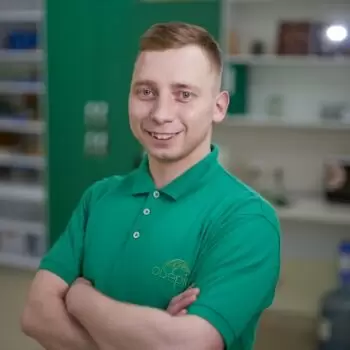
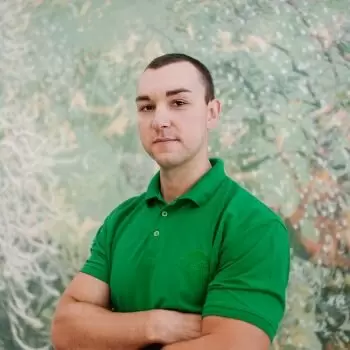
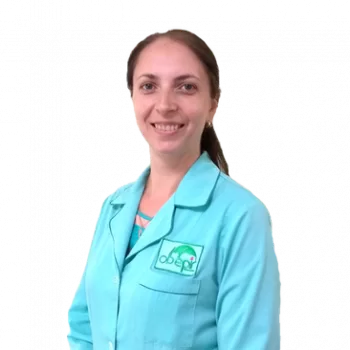

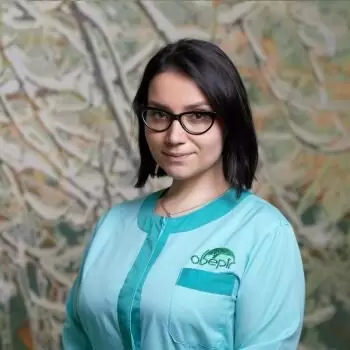
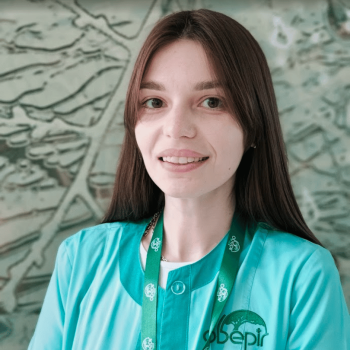

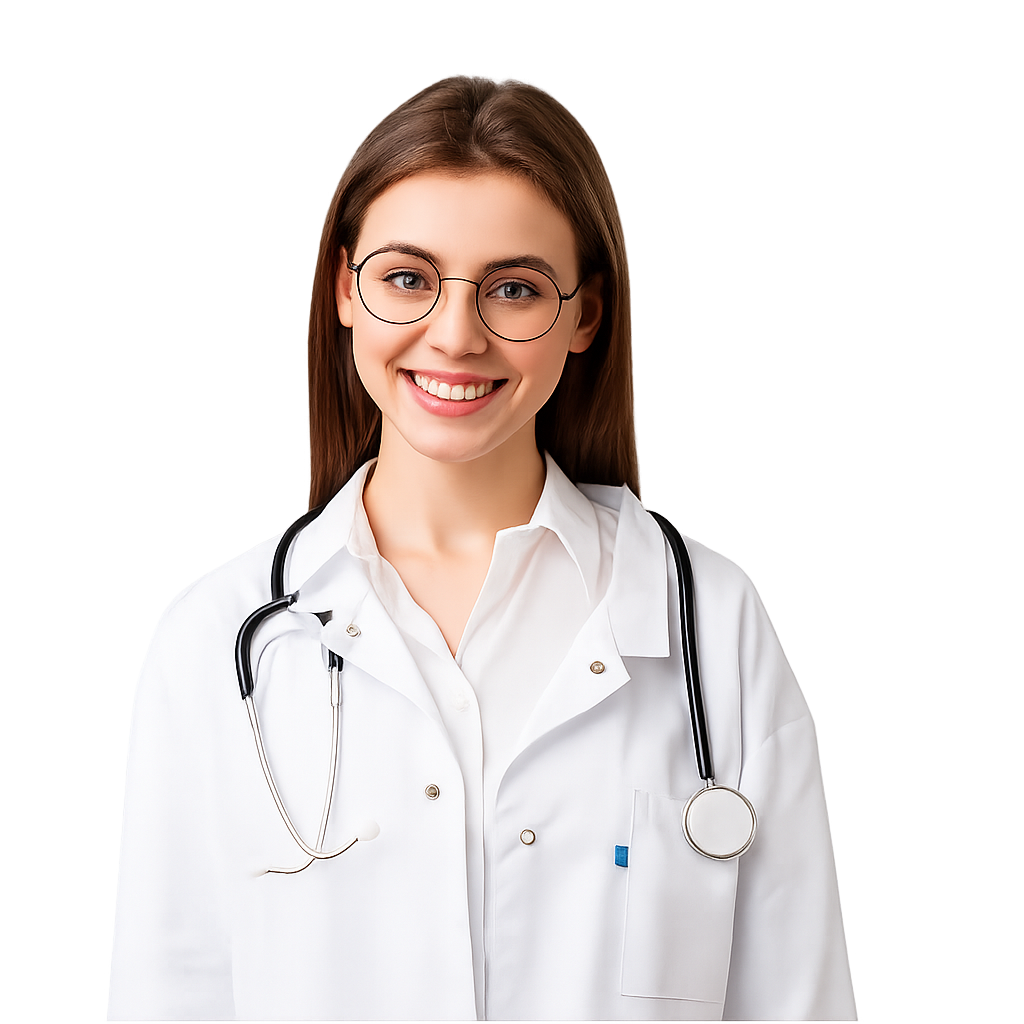
03.01.2026
Хочу висловити щиру подяку клініці «Оберіг» та всьому медичному персоналу за високий рівень організації, професіоналізм і людяний підхід до пацієнтів. Мій батько, 75 років, прох...